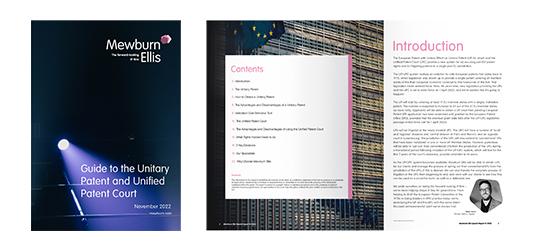The UPC is a new European patent litigation court. It will provide a single forum for the litigation of European patents (EPs) that are not ‘opted-out’ of the UPC’s jurisdiction and unitary patents (UPs). UPs will always be litigated at the UPC. EPs that have been opted out of the UPC will continue to be litigated in national courts. The UPCs jurisdiction also extends to matters relating to Supplementary Protection Certificates (SPCs) granted on these patents.
Seventeen EU countries are currently covered by the UPC, including Germany, Italy, France, and The Netherlands. Some EU countries have not yet ratified the UPC Agreement (e.g., Ireland) and others, including Spain, have decided not to participate. Non-EU countries within the European Patent Convention (EPC) system, notably including the UK and Switzerland, cannot participate in the UPC. UPs will not cover non-UPC participating countries. EPs validated in non-participating countries will continue to be litigated in the national courts.
The UPC is expected to provide a number of benefits over the current system of national court litigation in Europe, including:
- Reduced costs over parallel national litigation proceedings: By centralising patent litigation, the UPC is expected to reduce the overall costs of patent litigation for cases that would otherwise need to be litigated in multiple national courts, and they will be able to take advantage of the UPC's streamlined procedures.
- Enhanced legal certainty: The UPC's decisions will be binding in all participating countries, which will help to reduce the risk of inconsistent rulings from different national courts. This will provide greater legal certainty for businesses and investors.
- Faster resolution of disputes: The UPC's procedures are more front-loaded and focussed than those of some national courts, which should lead to faster resolution of patent litigation.
- Powerful remedies for patentees: The UPC introduces powerful preliminary measures (including preliminary injunctions) and final remedies that will be enforceable in all UPC contracting member states (for UPs) or in all contracting member states in which the EP has been validated. This fact may enhance the commercial value of a UP and EPs that have not been opted out.
- Central revocation for opponents: concerned parties can now, in addition to filing oppositions at the EPO, also attack UPs and EPs that have not been opted out at the UPC centrally.
Owners of an EP should carefully consider their EP validation strategy, including whether to validate a UP, and whether to opt out EPs of the UPC and instead litigate their cases in national courts. EP. Patents which have been opted out will stay opted out for their whole term, unless the patentee withdraws the opt-out (which they can do at any time).
National courts
The national courts in the individual countries will of course continue to have exclusive jurisdiction over national patents (i.e., granted by the national patent offices, not the EPO). This means that owners of national patents will still need to litigate their cases in national courts.
Forward looking
The UPC is a significant development in the field of European patent litigation. It is expected to provide a number of benefits over the current system of national court litigation, and fosters harmonisation across participating countries.
Now that the UPC/UP system is available, Mewburn Ellis can obtain UPs for their clients, manage the process of ‘opting out’ EPs from the jurisdiction of the UPC (if this is desired) and handle all aspects of litigation at the UPC, including infringement and revocation actions.
Find out more on our litigation page and UP & UPC page.
|
|
The Unitary Patent and the Unified Patent Court - A guide
|
Sean is a European IP lawyer. He is head of our legal services team and a member of our Management Board. He has over 20 years of experience advising on contentious and non-contentious IP matters, including patents, trade marks, designs, copyright, database rights and trade secrets. He has a particular focus on the life science, bioinformatics, pharma and advanced materials sectors. Sean works closely with senior management and their external advisors to deliver a wide range of IP related projects in a pragmatic and commercially-focussed manner, including on IP protection, commercialisation, technology transfer and litigation.
Email: sean.jauss@mewburn.com




